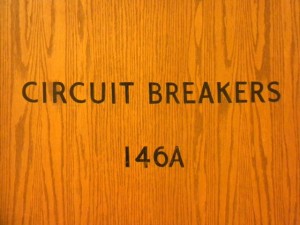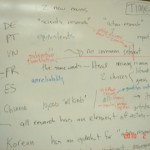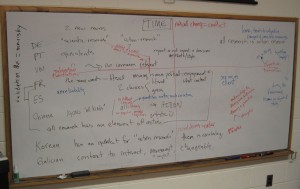UMass Translation Center
I recently gave my first talk on paradigm consciousness. The ideas have been floating in my mind since the spring of 2003, but only in the last few months has the knowledge come together well enough for me to try teaching them. My own mode of learning is through action research, and there actually is a sub-division called action learning, which is how I labeled my methodology after fending off the attacks of my dissertation committee’s self-appointed “bad cop” faculty member during the defense of my research proposal.
My main objective for the presentation was to test a method for raising “paradigm consciousness,” because this is a pre-requisite for understanding what motivates action research. There is a variety of literature about action research, much of which tends to skirt the really hard stuff: like what to do when someone in an organization really does not want to learn, grow, or otherwise be open to, let alone support, dealing with new knowledge. By being transparent about my method, I am attempting a parallel task with social research as Yonjoo advocated when she said that it is not whether a particular translation is “right or wrong,” but that the translator has been conscious enough of making decisions and choices so that “the translation can stand up.”
“paradigm consciousness,” because this is a pre-requisite for understanding what motivates action research. There is a variety of literature about action research, much of which tends to skirt the really hard stuff: like what to do when someone in an organization really does not want to learn, grow, or otherwise be open to, let alone support, dealing with new knowledge. By being transparent about my method, I am attempting a parallel task with social research as Yonjoo advocated when she said that it is not whether a particular translation is “right or wrong,” but that the translator has been conscious enough of making decisions and choices so that “the translation can stand up.”
Producing Research that Stands Up
Most scholars want their research to stand, but how many of us investigate the foundation on which research is supposed to stand? There is a choice between engaging knowledge as based in terms of philosophy (abstract, without application) or based in terms of practice (grounded, with consequences). Action researchers are engaged in practice, and “practice is messy” (personal communication, Dr. Leda Cooks). Applied research is messy because people are messy. No offense to anyone!
In Assault on Reason, Al Gore (2007) explains, “One of the world’s leading neuroscientists, Dr. Vilaynur S. Ramachadran, has written,
Our mental life is governed mainly by a cauldron of emotions, motives and desires which we are barely conscious of, and what we call our unconscious life is usually an elaborate post hoc rationalization of things we really do for other reasons.”
The tension that action research taps derives from fairly modest claims: that
- meaning is co-constructed in interaction, and that the
- meaningfulness of interaction (especially at the microsocial level) is malleable by human consciousness.
(If you disagree, let’s get it on!) I use a distinction between “meaning” and “meaningfulness” that tries to distinguish between definitions for words, phrases, behaviors and such that are relatively fixed in social time (the present) and the relationship between this ‘fixity’ and dynamical processes of understandings, disagreements, and other outcomes of communication that occur over time.
 My imagination about how the presentation would go is that I would share new information (specifically Burrell & Morgan’s four paradigms of social theory), and create some activities that would make it possible for participants to find ‘where you fit’ in that scheme. I realize some of you rejected the model outright or found it too simplistic, but I am not convinced that the schema is inadequate…? I am quite interested in further engagement on this point! Cris caught my attention with his observation that translation theory in recent years has moved quite far away from the “objective” end of the horizontal axis toward the “subjective” end. We did not get into the details of Burrell & Morgan’s components, but they include individual views on ontology, epistemology, human nature, and methodology along the horizontal axis. Their vertical axis involves views on social cohesiveness and unity (how societies regulate themselves to stay together) and modes of domination and structural contradictions (how individuals strive to overcome structural limitations by inducing radical change).
My imagination about how the presentation would go is that I would share new information (specifically Burrell & Morgan’s four paradigms of social theory), and create some activities that would make it possible for participants to find ‘where you fit’ in that scheme. I realize some of you rejected the model outright or found it too simplistic, but I am not convinced that the schema is inadequate…? I am quite interested in further engagement on this point! Cris caught my attention with his observation that translation theory in recent years has moved quite far away from the “objective” end of the horizontal axis toward the “subjective” end. We did not get into the details of Burrell & Morgan’s components, but they include individual views on ontology, epistemology, human nature, and methodology along the horizontal axis. Their vertical axis involves views on social cohesiveness and unity (how societies regulate themselves to stay together) and modes of domination and structural contradictions (how individuals strive to overcome structural limitations by inducing radical change).
At any rate, I’d like to reflect upon the notes I scribbled all over the board while we were talking about the challenges of translating the claim:
“All research is action research”
The diversity of languages was pretty exciting in and of itself: Chinese, French, Galician, German, Korean, Portuguese, Spanish, and Vietnamese. There are different tools one can bring to the service of action research; my primary tool is discourse analysis. So what interested me the most was not the actual translations, but what was said about making the decisions. (The words and phrases I recorded appear mostly in blue, but sometimes black – I wanted more colors, and a few times I was rushing and didn’t switch colors.) This level of discourse (the descriptions, opinions, and judgments) shows what is normative about translation decisions – and these norms and prescriptions bring paradigms into view. In this ‘on-the-spot’ workshop-like situation, unless you were lucky enough to know the equivalent jargon for “all research is action research” in the target language (as happened with Korean), you had to rely on “literal” or “equivalent” words on a term-by-term basis that everyone recognized was probably inadequate. Maria Jose succinctly summarized this choice: “Be literal or guess!”
We spent the most time talking about the Chinese translation because of its idioms and the special way it treats quantities. Also, I admit that I especially enjoyed its artistic quality because of the combination of precision (at the level of semantic meaning) and accuracy (the general aim of what I am reaching toward: interpretation – and action research – as kinds of art). The French version also captures the definition: it was back-translated as, “All research has an element of action.” But – so what?! Does the content knowledge (the “finding” of an acceptable way of saying “all research is action research” in another language) establish the baseline for what matters most in the work of translating and/or interpreting? Is the bottom line always the “non-risky” translation, the one that is confirmed when two or more translators come up with the exact same diction, grammar, verb tenses, and phrasing in the target language?

Work with me here, okay? Let me extrapolate a little bit. The need to know context, relationship, or ‘what comes next’ is about control. Remember the vertical axis of Burrell & Morgan’s paradigm grid: from the sociology of regulation at the bottom to the sociology of radical change at the top? Now, I am not saying interpreters or translators do not need to know context, or that it does not matter whether we do or do not know the terms of engagement. Several of you said you needed to know the context, that you understood there is an implicit movement, even a kind of changeability that comes about because of interaction, because of the implications of engagement and interaction… and I agree in general, but why do you need to know?
In our example, someone explained that the term “action research” is “loose,” it “tends to the subjective,” and “is charged with possible meanings.” Yes, but is it the range that is so problematical, or is it because, as someone else said, the meaning of action research is “more political”? Let me ask, why is this “meaning” – the meaning of this term, this concept – any more, or less, “political” than any other? While acknowledging that you may consider all translation choices political, let me get really crazy and pose a hypothesis: the stakes are higher because claiming an element of action in all research means NO research is without effect. The German translation boldly went all the way, “scientific-research is action-research.” In other words, any and all kinds of research ACTS upon the world, in this or that direction, for this or that purpose, with effects that have material consequences. Good, bad, sloppy, indifferent….. and so it is with language, too, even conservative choices have an effect. If, for instance, the goal of interpretation is to strive to say the most common thing (the non-risky, that which is verified by others), what happens when the interlocutors are not seeking such banality?
goddag yxskaft
What is “the action” of action research? If I’ve done my job well, you are considering paradigms more carefully. This matters, because the way we talk about translation and interpretation shapes what clients expect. I suspect that Members in the European Parliament, for instance, are motivated to use lingua francas partly because they have been consistently disappointed in the measurement of ‘objectivity’ they were taught to expect. It is as if, in the professional desire to reassure clients that we are sticking true to their text, e.g., not changing anything, we wind up contributing to a structure of regulation that minimizes or discounts our labor. If you are happy with this, no problem! But if you are not, the take-away is not to confuse the current lean toward subjectivity as necessarily having anything to do with societal change. This is precisely the point that Loc Pham asked about: can one tread between paradigms? Finding a meaningful answer to that question requires much more attention to the vertical order-conflict axis. As interpreters and translators, we must be able to conceptualize our work in terms of a ratio between supporting the current regulated order and working toward radical change.
Steph, when you stated above:
“The tension that action research taps derives from fairly modest claims: that meaning is co-constructed in interaction, and that the meaningfulness of interaction (especially at the microsocial level) is malleable by human consciousness,”
do you mean that this is the way that action research is used, or that this social form of learning is in fact a required component of learning?
I get the feeling that you are discussing the research of a system with the consciousness of being within that system. (Wikipedia did not help :o) So in the case of interpreting, an interpreter has to use the tools of one language or paradigm to translate from another. An awareness of the interaction between the interpreter and the governing language system would be useful…Is this action research? I also read your post about your proposal defense. (Sounded rough but keep at it!) I really liked the the quote about functional environments. I think that is so true. Are you suggesting that action research is a way to modify a functional environment of research?
YES, Julian! You got it! Exactly! How do we (any of us, ever, anywhere, anywhen) understand what it is that we are in?
“What it is’ meaning the social system of meaning and action that gives any kind of ‘sense’ to behavior, interpretations, choices…. and allows us to explore proactive ways of supporting those parts of these systems that we like/want to keep, and changing those parts of these systems that don’t work so well….
Action research tries to find the boundaries of what can/can’t be influenced, through
a) discovering the resistances in the system and
b) learning with participants inside and outside of the system where flexibilities are, and then
c) experimenting – collaboratively – with small changes at these flexible boundaries to see if they lead to preferred larger-scale outcomes.
Julian,
I went back to see what quote you were referring to, and have pulled out this excerpt:
It happens to provide a nice base for answering (in my way of playing with language, grin) Jeffrey’s question about tensions in action research. Ideally, Jeffrey, action research should be used to show how agents (people in interaction) “maintain” particular “conventions and invariants” in our communication with each other. When individuals begin to share the recognition of picking and choosing a particular “functional environment” out of the entire complex material environment, then – cooperatively – these individuals can consider
a) the adverse effects of the chosen/established environment and
b) the possibilities of making other choices and thus creating different functional environments.
As to the other option posed by Jeffrey, I don’t see them as exclusive? Perhaps I am not fully understanding, so let me re-phrase. You re-labeled “action learning” as a “social form of learning” and asked if I’m saying that social (inter)action “is in fact a required component of [all/any] learning?” Developmentally, absolutely, although obviously there is evidence of people learning in isolation. These cases are rare and I doubt there would be many who would suggest that individuals who learn exclusively on their own reach their intellectual or creative potential.
If we take “research” in the informal, everyday sense, of course this is what kids are doing when they test the boundaries of their parents authority, right? All of us have ‘tested’ in this way, some of us more than others (and, dare I say, some of us still!)
I suppose the distinction that I’m offering for a formal definition of action research by social theorists is that we’re not doing it just to find out what we can get away with. Rather, we’re deliberately probing the edges of collective imagination. For instance, can large clusters of humanity move beyond “nation” as the central organizing principle of individual identity? Can aggregates of pacifists in different disciplines, socioeconomic classes, positions of institutional and community authority and so forth transcend whatever other divisions (of race, religion, gender, etc) in order to end (for instance) organized militarism?
If we are to succeed in such massive transformations of the global political-economy, it will be because of a cascade effect stemming from tiny shifts in interpersonal interactions. Action research is the only methodology that overtly aims at this kind of exercise in creative human imagination. Ethnography approaches this ambition but hasn’t yet made its case.